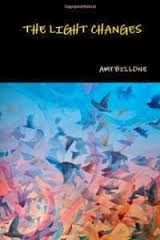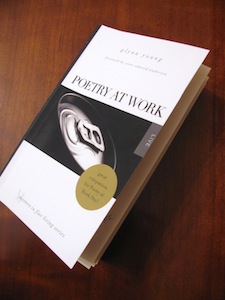In Amy Billone’s The Light Changes: Poems, the poet throws herself in front of a train—and lives to tell the story. Not exactly what you expect from poets and poems.
Grace
I was raped by a speeding train. I asked it to.
I threw myself before it. I extended my legs, arms.
It came when I called it. Oh what enormous
metal thighs. Oh what fast thudding hips. Again
again against my blackening eyes, skull, chest, waist—
I loved its greasy sighs. I loved its wild blows.
My mind flew away. Who pulled me from below?
Who fed me with a tube? Who brought me
sunflowers? Who hummed me lullabies? Who
pardoned me? Who ripped my shame in two?
The reasons for throwing herself in front of a train are unspoken, although the act had been preceded by various accidents over the years. What is spoken is the aftermath—the six-and-a-half-day coma, the doctors saying she would never speak again, her father by her side like he’s been by her side so many times before, and, defying the doctors, what she says when she awakes: “Hi Dad.”

The poems about the train incident form only the first of the four parts of Billone’s collection. But it is attention- and interest-grabbing, and you’re pulled in to find what happened and why. You may or may not be disappointed in the answer.
The poems in the collection are diverse and varied—longer and shorter, prose poems and “structure” poems, but all engaging, all wrapping around you with a sense of quiet, and quiet reflection. It is not only Amy Billone who writes and walks these pages; Virginia Woolf is here, both in the introduction and explicitly in a poem (about a conversation on an airline flight).
So, too, is the late poet Jack Gilbert, who died in 2012 from complications from Alzheimer’s. Billone includes a particularly wonderful elegy for Gilbert, about the poet meeting him while he was still working but already experiencing the onset of the disease. The elegy for him becomes an almost haunting plea for the poet talking with him, a plea that he might know her name. We don’t know if that happens or not, but those few lines at the end express an almost exquisite sorrow, the diminishing of a great poet who nevertheless will leave a legacy in his poems. But we do want him to know our names, too.
I read The Light Changes three times, and each time it became a deeper work.
Or it might have been that I read it more deeply.
Billone is an associate professor of English at the University of Tennessee and the author of the academic work Little Songs: Women, Silence, and the Nineteenth-Century Sonnet. Her poems and articles have appeared in a number of literary and academic journals.
Image by giert.com. Sourced via Flickr. Post by Glynn Young, author of the novels Dancing Priest and A Light Shining, and the just-published Poetry at Work (T. S. Poetry Press).
_____________________________
Poetry at Work, by Glynn Young, foreword by Scott Edward Anderson
“This book is elemental.”
—Dave Malone
- Longfellow’s “Paul Revere’s Ride”: Creating a National Legend - April 17, 2025
- Poets and Poems: Katie Kalisz and “Flu Season” - April 15, 2025
- Poets and Poems: Michelle Ortega and “When You Ask Me, Why Paris?” - April 10, 2025



Maureen Doallas says
Sounds fascinating. Put the title on my list.
nance.mdr says
Who brought me
sunflowers?
Who sat for hours
and hours until
time stood still?
Diana Trautwein says
Wow. I think this is on my list now, too.